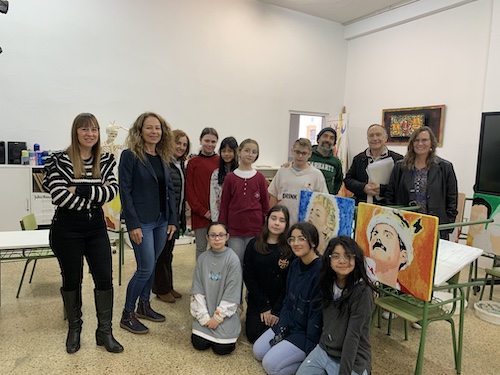 Dean of the WNMU College of Education Cindy Martinez (right) and Professor of Bilingual/TESOL Education Alexandra Neves (second from left) visited multiple classrooms in Spain this springSILVER CITY, NM – Two members of the WNMU College of Education, Dean Cindy Martinez and Professor of Bilingual/TESOL Education Alexandra Neves, spent part of spring semester in Asturias, Spain, where they visited la Universidad de Oviedo (the University of Oviedo), gave presentations, and made a number of classroom visits.
Dean of the WNMU College of Education Cindy Martinez (right) and Professor of Bilingual/TESOL Education Alexandra Neves (second from left) visited multiple classrooms in Spain this springSILVER CITY, NM – Two members of the WNMU College of Education, Dean Cindy Martinez and Professor of Bilingual/TESOL Education Alexandra Neves, spent part of spring semester in Asturias, Spain, where they visited la Universidad de Oviedo (the University of Oviedo), gave presentations, and made a number of classroom visits.
The University of Oviedo is familiar to Neves, as she spent a year teaching there while on sabbatical from WNMU in 2019. The university is also an international partner of WNMU, and the two universities have a memorandum of understanding that allows students from either institution to study at the other.
That memorandum was part of the motivation for making the trip, as it was set to expire. Martinez and Neves were also looking for ways to encourage the kind of exchange the memorandum facilitates. "In past years, we regularly had exchange students from Universidad de Oviedo, but with COVID, that stopped," said Martinez, adding that their trip was in part motivated by a desire to re-energize the exchange. "Hopefully the things we were able to communicate there will enable it and take away some of the roadblocks," she said.
One of their take-aways from the visit was a better understanding of how very different the path to becoming a teacher is in Spain. Said Martinez, "For me, it was really eye-opening to see how Spanish education worked. … The process of getting into education [in Spain] is much more difficult and arduous than it is for us."
Neves added that prospective public-school teachers have to pass an especially challenging test. "They have this exam for public schools, and it is very difficult to pass, so it is very difficult to become a teacher there," she said.
Unlike in the United States, in Spain there are more prospective teachers than jobs available to them. This could create a benefit for states like New Mexico, said Martinez, if these prospective teachers were to come to the United States. Just last year there were 700 vacancies for teaching positions across the state.
Neves and Martinez gave a number of presentations about the WNMU College of Education, the New Mexico Center of Excellence for Early Childhood Education, and more generally about the American education system. A number of the students they spoke with expressed an interest in studying or working in New Mexico.
During their time in Spain, Martinez and Neves also were able to visit many different types of schools, including rural schools and a bilingual school. The latter was especially informative, said Martinez, as it allowed them to see a model of bilingual education at multiple age-levels. "We got to see instruction at the four-year-old classroom and then at the third-grade level, moving through to the sixth grade," she said. "Seeing multiple levels let us see the trajectory and the developmental piece."
"It is something we have talked about doing down at the [Early Childhood] Center for years—bringing in what true bilingualism looks like," said Martinez, "Actually seeing that model in process through the years was inspiring."
Neves said that seeking this kind of inspiration is essential. "We don't live in a village anymore. We are globally connected," she said. "Even in our teacher preparation standards, you see it. Throughout those standards, it talks about global issues—being globally aware—and I think when faculty and administration are exposed to what education means in other countries, it informs our practices here, and we are better because of that."












